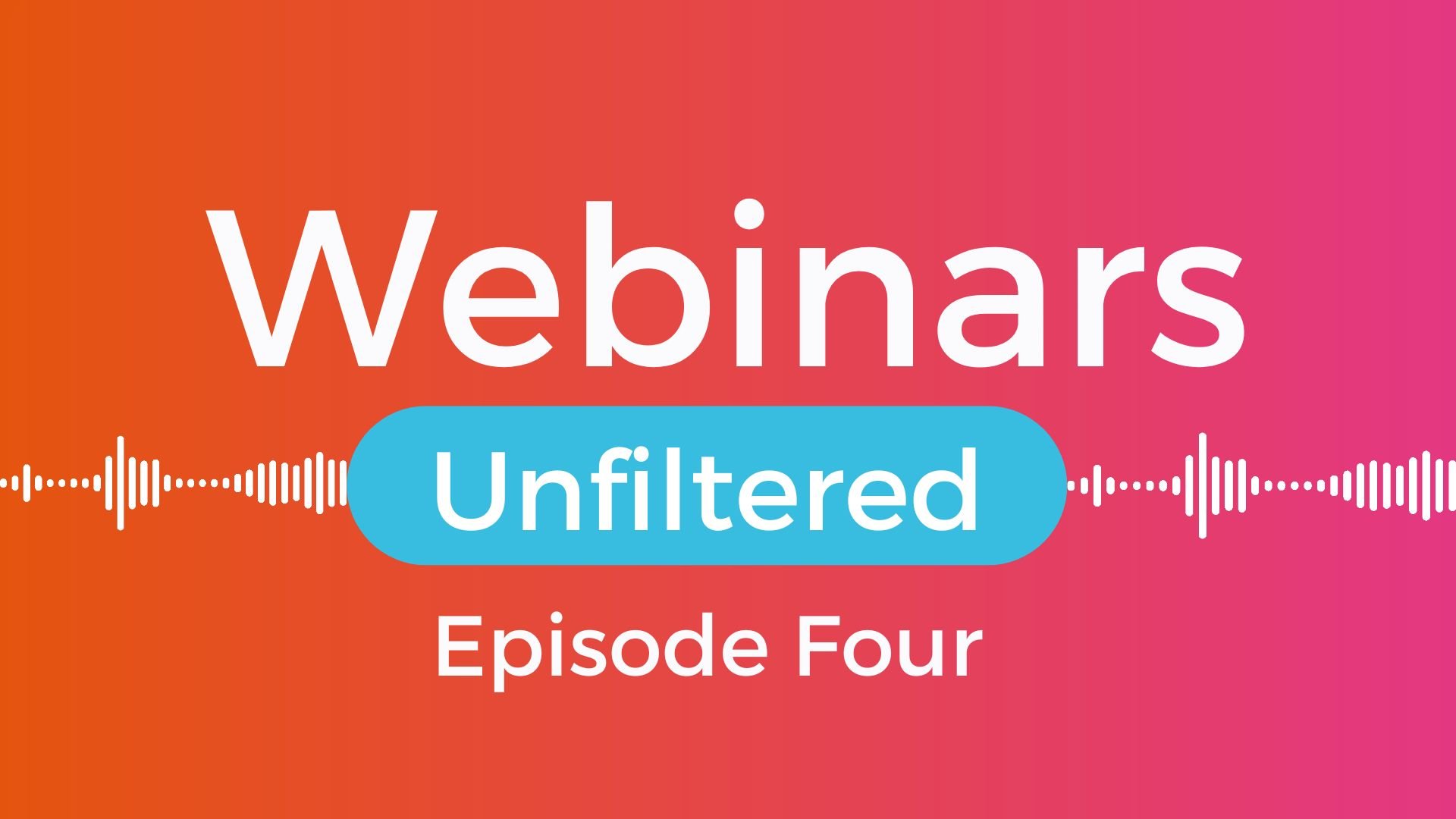[Updated for 2023] The pandemic may have shaken things up for the tech industry, but webinars are here to stay. People and businesses are discovering the power of webinars for connecting with their audience and making a lasting impression. So, the big question is, which webinar platform should you choose?
With so many webinar platforms to choose from, selecting the perfect platform can feel like a daunting task. All you have to do is Google the word 'webinars' and you’ll be inundated with choice. It can all be really confusing, even if you’re already using a webinar platform.
However, before you go ahead and choose a webinar software provider, there are a few key things to consider: your goals, your budget, your content, and your audience. Once you know what you need from a webinar platform you can then begin to research and determine which provider has the best product for you.
Part of this research is making sure that their solution and business model are compatible with what you want to offer to your audience and that your ROI plans can be achieved with them.
We know it can be confusing to navigate the world of webinar platforms and providers, so we’ve identified some of the best webinar questions customers have asked us and some of the most important questions you should ask to make sure you’re on the road to webinar success.
- What are my webinar branding options?
- What are the real webinar costs?
- What are your unique webinar features and how can they benefit me?
- What types of webinar reporting and analytics do I get?
- Will my webinar be available on multiple devices and browsers?
- How secure is your server and can you provide different levels of access for my webinar?
- Will I be able to access my webinars after the live event and can I archive them?
- What kind of webinar support do you offer?
- What webinar integrations can I benefit from?
- What types of webinars can I host?
- How scalable is your webinar platform?
Have 15 minutes? Learn everything you need to know about choosing a webinar provider from WorkCast's webinar experts.
1. What are my webinar branding options?
Branding is super important for any company, regardless of its size. What we’ve noticed from speaking to prospects and customers is that not all webinar platforms offer you the option to customize the entire attendee workflow experience - right from the landing page to the live event page to email communications. There are many out there that provide you with a bog-standard template that you slap your logo onto, and some even feature their own branding more prominently than your own (on your webinar!).
This can be a big issue if your webinar is sponsored and if your sponsor has certain requirements. In some cases, featuring your logo or your sponsor’s logo and brand creatives can cost extra, so make sure you ask about this upfront.
2. What are the real webinar costs?
When it comes to webinar packages, features, and additional features, things can get complicated. But, that’s only if you let them.
Make sure you know exactly what you want from your webinars and webinar platform, and when asking for a quote, be clear about what you need and make sure those features are included in the total price.
A lot of people will go for a basic package - too tempted by the £99.99/month to realize that the features they actually need will be added costs. Before making that decision, compare the offers and the features. There’s nothing worse than realizing that what you actually wanted and needed for your webinar isn’t included in the package.
3. What are your unique webinar features and how can they benefit me?
All marketers know, the USP (unique selling point) is key. Don’t hesitate to ask webinar providers what makes their solution unique, what makes them stand out from the crowd.
This will help you better understand how they can best serve you and help you stand out to your own audience.
Are they offering a unique way in which you can monetize your webinar? Do they have an innovative way to present your content? You may find out that one platform has a cool feature you didn’t know to ask about, but that will make a real difference when engaging your audience.
4. What types of webinar reporting and analytics do I get?
Needless to say, in business, marketing and sales KPIs, reports, and figures are important. If you’re using webinars to promote your content, generate leads, engage, and generate revenue, you will need data and insights to measure their effectiveness.
Think about your webinars’ KPIs and about what sort of reports your business would need (drop-offs, engagement, interaction, subscribers vs attenders, revenue, etc.) and see which of the webinar providers can offer you the right reporting tools for your business.
You’d be surprised at the differences in reporting capability between webinar companies, and what some will charge you extra to be able to see.
5. Will my webinar be available on multiple devices and browsers?
If you already know your target audience and the personas that go along with them, then you should also have data related to the devices they are using and how they access your content. So, it’s vital that any webinar software you plan to use will reach that audience.
Does your viewing audience use Chrome? IE11? Will they be watching on a laptop or their mobile? Are they Android or Apple users? These are important things to know so you can ensure your webinar platform can cater to their needs.
And, even if you don’t have that data, you want to ensure that your content is accessible, and that means being available across browsers and devices.
While it seems like a given that webinar platforms would perform across all devices, there are barriers - some require app downloads, and others may not be available on older browsers - so, it’s important to know before investing your time and your money.
Another thing to consider is how your audience will access your webinar. Many companies restrict plugins (some webinars request plugins in order to work) or access to websites such as YouTube. If your target audience works for the NHS, for example, a solution that relied on either of these would make it impossible for them to join your webinar.
6. How secure is your server and can you provide different levels of access for my webinar?
You‘d be surprised to discover how many people don’t ask about security and access levels when signing up for a webinar solution.
We are all aware that security is important, especially these days. Webinar platforms are not all created equal when it comes to security - not everyone will have an end-to-end approach that not only keeps your (and your customers’) data secure, but also ensures performance reliability. Webinar security issues can lead to data breaches, platform downtime, and unexpected headaches for the user.
Another important element is a variety of access levels. Let’s say that you have four speakers invited, they all need some sort of access to upload their content and present. You don't give them all admin access - customer lists, analytics, etc. - or access to your entire webinar. You might consider giving them restricted access, which would allow them to use only the features that they need, without interfering with the rest of the webinar’s content.
You’ll need to make sure that this is a feature the webinar platform offers so that you don’t run into security issues down the line.
7. Will I be able to access my webinars after the live event and can I archive them?
Your webinar’s life shouldn't be over once the live event is over. Webinars are evergreen content, and you should leverage them out with the live event to maximize your ROI.
When considering a new webinar platform, make sure you know whether they offer access to your webinar once it’s over, with specific attention to on-demand availability. Does on-demand cost more? Can you run simulive? If you’re planning a series of events, a personalized channel or webinar library with references to all your events might be a great idea for better engagement.
If you’re moving over from another webinar platform, it will also be important to ask about housing webinars from your old platform. Will your new webinar provider have the ability to migrate these over? You don’t want to lose your entire webinar library just because you didn’t ask the question.
8. What kind of webinar support do you offer?
Support, both technical and otherwise, is essential, especially when you start using a new product. Make sure you ask about what kind of webinar support your new provider can offer you and what is included in your quote. Do you get email support? An account manager? It’s good to know, so you can plan accordingly.
You may want also want to investigate a fully managed event solution, where the webinar provider sets up and manages the event, so you can focus on content and presenting. Consider your options, the benefits, and your budget.
The important thing when making any decision, but especially when comparing webinar platforms, is to define your goals. This is the only way you’ll know what you need from a webinar solution. So make sure you ask these important questions before you commit your time and your budget.
9. What webinar integrations can I benefit from?
When you're scoping out webinar platforms, don't forget to ask about their integrations. Why, you ask? Well, let us tell you. The right integrations can elevate your webinars to the next level. Imagine having your webinar data seamlessly connect to your marketing and sales efforts, giving you a bird's eye view of the impact it's having on your business. And if you're already using some killer tools to run your show, finding a webinar platform that plays nice with them can save you time and give you that efficiency boost you never knew you needed. Trust us, ask about integrations, it's a no-brainer.
10. What types of webinars can I host?
Not all webinar platforms support the same types of events. Some providers may only support live webinars, while others may also offer options for on-demand and simulive webinars, hybrid webinars, virtual events, and webcasts. Understanding what types of webinars you can host with a potential provider is important because it helps you make sure the platform will meet your specific needs and support the types of events you want to host. Additionally, some providers may have limitations or restrictions on the types of webinars you can host, such as a maximum number of attendees or the duration of the webinar, so it's important to understand these restrictions up front.
11. How scalable is your webinar platform?
Scalability is a big deal. You want to make sure that the platform you choose can grow with you and your business, because as you start to host more webinars, you'll likely have bigger audiences and more complex requirements. This is one of the main reasons why businesses move from meeting tools to purpose-built webinar platforms. If your provider isn't able to accommodate that growth, you might end up having to switch to a different platform down the line. And nobody wants that, am I right? So make sure to ask about scalability before you sign on the dotted line. Trust us, your future self will thank you for it!
Round-Up
So, there you have it folks, all the important things you need to consider when choosing the right webinar platform for your business. From branding options to the real costs, unique features and benefits, reporting and analytics, device and browser accessibility, and security and access levels. By taking these factors into consideration, you can ensure that you choose the right webinar platform for your business, which will allow you to effectively engage your audience and measure the success of your webinars.
Want to see if WorkCast can help you with your webinar goals? Get started with a free trial today.
Learn how to run incredible webinars with our Ultimate Webinar Handbook.
Share this
You May Also Like
These Related Stories

5 Ways to Generate More Leads From Your Webinars

Live vs On-Demand & Simulive Webinars: What’s the Difference



